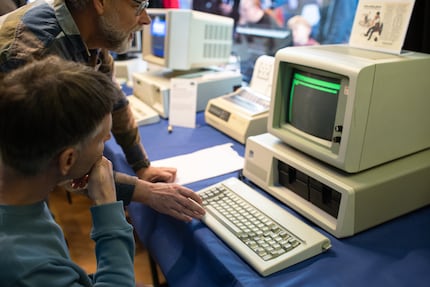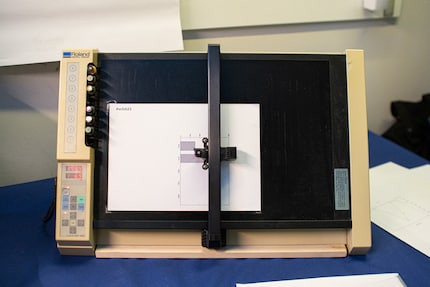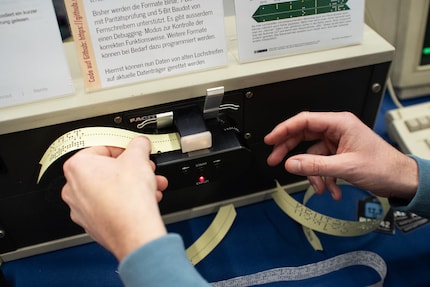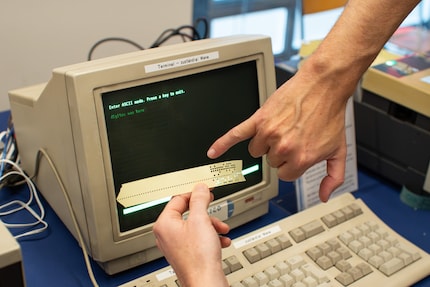
Background information
Sharp Pocket Computer E-220: oops, I did it again
by David Lee

Here are my impressions of the 2023 Vintage Computer Festival in Zurich – all saved on punched tape. Well, almost.
Is vintage en vogue? Or was it the gloomy November weather? Or even the fact that my colleague Martin Jud gave everyone the heads-up? In any case, the 2023 edition of the Vintage Computer Festival (VCF) was well attended. Kraftwerk Selnau in Zurich was heaving.
And rightly so. The exhibition had a lot to offer and included a good mix. As expected, I spotted vintage classics such as the Commodore C64, the Amiga 500, Atari and IBM PCs as well as the good old cube Macs. But also computers from the 19th century, the Enigma cipher machine and a lot of devices I’d never heard of, such as the Lilith (site in German) system developed at ETH Zurich. Or «portable» computers with a keyboard, CRT screen and printer. They can only really call themselves portable because they’re built into a huge case.
Visitors could try out a lot of these things themselves. You could choose from a range of small tasks, known as challenges, at the entrance. Each A5 sheet contained one easy, medium and difficult task.

Let’s head into the turmoil. I try my hand at a moderately difficult task that sounds easy: «Use Lotus 1-2-3 to create a chart of the estimated number of visitors to the VCF in the last five years and make a hard copy with a pen plotter.»
So I sit down at an IBM PC from 1981 and stare at a green table on a black background. Just filling in the cells takes me a good few minutes. After that, I’m a bit stumped. One of the exhibition staff tells me I have to press the backslash key to enter a command. This allows me to create a bar chart from the data entered. I then have to save this and exit Lotus, a different application actually prints the graph. I’d never have managed without instructions.

Printed out isn’t the right word for what happens next. The pen plotter draws the graphs almost like a person would – just a bit faster and with more precision. It’s fun to watch, even though it takes quite a while for all the bars to be shaded in. In the meantime, I can’t do anything on the PC, but that doesn’t matter as I wouldn’t know where to begin anyway.

At another stand, I type text into a terminal, but instead of being displayed on the screen, it appears as code on a punched strip. The strip is then scanned in again on another machine and my previously typed text pops up on the screen.

Stored on the strip is a piece of extremely important information: «digitec was here». Each column is a letter, or rather a byte. Consisting of 8 bits, a hole is a 1, and no hole is a 0.

I’m not nostalgic, I’m too young to have any recollection of punched tape. However, that doesn’t stop it being fascinating. I can see the stored data and even feel it. People always say that digital isn’t sensory, but that’s not the case here.
Another highlight of the festival is the Apple Lisa. It’s the forerunner to the original Macintosh, and the desktop interface looks similar. While it was a flop commercially due to the steep price tag, it was a milestone in terms of technical merit. Unfortunately, I can’t use the device for my challenge as it’s always occupied. Instead, I sit down at the Macintosh next to it featuring an A4 portrait format screen. This configuration was the peak of desktop publishing in the 80s. I start playing Crystal Quest on it. In landscape format.
These were just three among numerous fun opportunities available. I could’ve made a 90s-style website or gamed like they used to at a 90s LAN party. Alternatively, I could’ve tried my hand at C64 synthesiser music. However, a lot of this requires not just time but also prior knowledge – or at least someone to help you. The latter wasn’t always possible given the sheer number of visitors. Maybe I can catch up on some of the exhibits in 2024. After all, vintage computers don’t become obsolete; they just get better with age.
My interest in IT and writing landed me in tech journalism early on (2000). I want to know how we can use technology without being used. Outside of the office, I’m a keen musician who makes up for lacking talent with excessive enthusiasm.
Interesting facts about products, behind-the-scenes looks at manufacturers and deep-dives on interesting people.
Show all